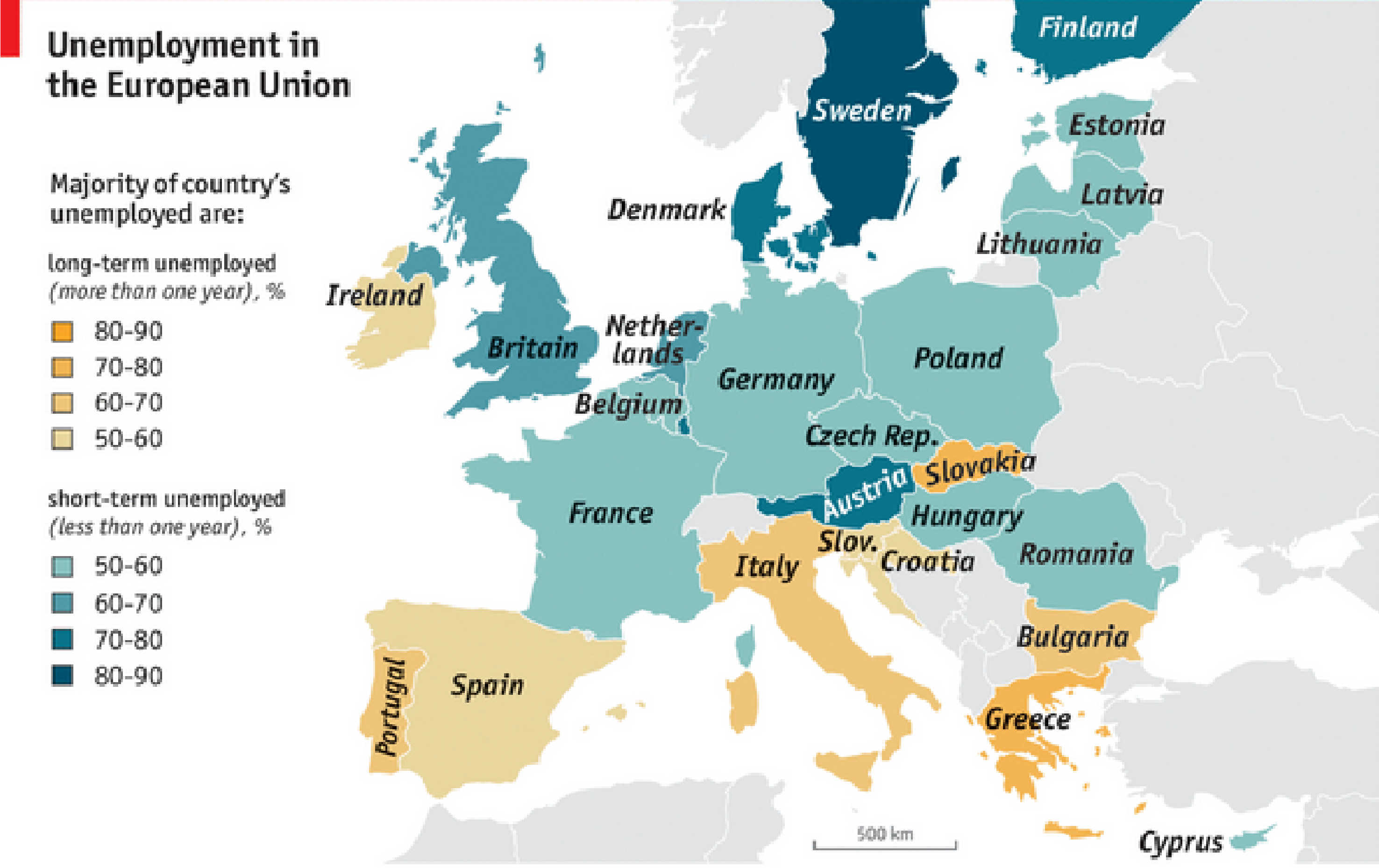Sawicki, Dawid, (2015), “Rising inequality in the Eurozone underlines the need for a fiscal union”, LSE blog, 3 Ιουλίου. How has inequality within Eurozone states changed during the pursuit of Economic and Monetary Union? Dawid Sawicki writes that in the majority of Eurozone members income inequality has increased substantially since 1990. He argues that this is partly the result of a lack of automatic stabilisers within the Eurozone that can compensate …Read More
Daily chart: Europe’s long-term unemployed, Continental drift
“Daily chart: Europe’s long-term unemployed, Continental drift”, The Economist, 28 Ιουλίου 2015. Over the past six years, long-term unemployment in Europe has swelled. Around half of Europe’s 25m unemployed have been jobless for over a year. Over 12% have not worked for more than four years. Aside from rising poverty levels, the problem brings a further set of difficulties that can render it self-sustaining. Skills are forgotten, confidence drains, fertility slows and …Read More
Can the Euro Be Repaired?
Pisani-Ferry, Jean, (2015), “Can the Euro Be Repaired?”, Project Syndicate, 31 Ιουλίου. When Wolfgang Schäuble, Germany’s finance minister, recently tabled the option of a Greek exit from the euro, he wanted to signal that no member could abstain from the monetary union’s strict disciplines. In fact, his initiative triggered a much broader discussion of the principles underpinning the euro, its governance, and the very rationale for its existence. Σχετικές Αναρτήσεις …Read More
Breaking a Taboo: Plans for Euro-Zone Tax Take Shape
Sauga, Michael, Reiermann, Christian, Schult, Christoph, (2015), “Breaking a Taboo: Plans for Euro-Zone Tax Take Shape”, Spiegel Internationale, 30 Ιουλίου. After the Greek bailout disaster, Paris, Berlin and Brussels want to reform the euro zone by creating an economic government and a special tax for the currency area. German Finance Minister Schäuble is in favor, but Chancellor Merkel is skeptical. Σχετικές Αναρτήσεις Mitchell, B. (2014) “Solving tax avoidance will not cure the Eurozone …Read More
The Euro, Like The Gold Standard, Is Doomed To Fail
Pettifor, Ann, (2015), “The Euro, Like The Gold Standard, Is Doomed To Fail”, Social Europe Journal, 31 Ιουλίου On 20th July, 2015 Jacques Delors reached the grand old age of ninety years. President Hollande saluted the elder statesman and told Journal du Dimanche, that “in the past week the European spirit (had) prevailed” in addressing the Greek crisis. This referred to the long, brutal and historic overnight negotiations of 12th July, between …Read More
European Banks’ Sovereign Debt Home Bias: Voluntary or Involuntary?
Horváth, Bálint, Huizinga, Harry, Ioannidou, Vasso, (2015), “European Banks’ Sovereign Debt Home Bias: Voluntary or Involuntary?”, Voxeu, 31 Ιουλίου When banks invest heavily in sovereign debt, and in domestic sovereign debt in particular, the result is a debt home bias. This column presents evidence of a partially voluntary and partially involuntary sovereign debt home bias among large European banks. This bias is stronger if the sovereign is risky and shareholder rights are strong or the …Read More
The stabilising properties of a European Banking Union in case of financial shocks in the Euro Area
Breuss, Fritz, Roeger, Werner, In ’t Veld, Jan, (2015), “The stabilising properties of a European Banking Union in case of financial shocks in the Euro Area”, European Commission publications, Economic Papers 550, June 2015 This paper analyses the stabilising properties of a European Banking Union in case of financial shocks in the euro area. We compare output losses under national interventions (‘bail-out’) with resolution mechanisms included in the banking union, namely resolution via the euro area’s …Read More
When ‘Secular Stagnation’ meets Piketty’s capitalism in the 21st century. Growth and inequality trends in Europe reconsidered
Pichelmann, Karl, (2015), “When ‘Secular Stagnation’ meets Piketty’s capitalism in the 21st century. Growth and inequality trends in Europe reconsidered”, European Commission publications, Economic Papers 551, June 2015 Europe not only continues to struggle to leave the legacies of the crisis behind it; economic growth remains also weighed down by unfinished macroeconomic adjustment and sluggish implementation of reforms, as well as long-standing poor productivity growth trends. Against that background, the spectre of “secular stagnation” has …Read More
There is more to the Eurozone than the division between ‘North’ and ‘South’
Kral, Daniel, (2015), “There is more to the Eurozone than the division between ‘North’ and ‘South’”, LSE blog, 30 Ιουλίου. Opposition to the proposed Greek bailout deal has generally focused on the role of Germany, but how do other Eurozone states view the debt crisis? Daniel Kral notes that while there is a tendency to present the crisis as a stand-off between the Eurozone’s ‘North’ and ‘South’, the situation is …Read More
Economic Convergence of Central and Eastern European EU Member States over the Last Decade (2004-2014)
Forgó, Balázs, Jevčák, Anton, (2015), “Economic Convergence of Central and Eastern European EU Member States over the Last Decade (2004-2014)”, European Commission publications, Discussion Paper 001, JULY 2015 This paper takes stock of the progress achieved by the ten Central and Eastern European countries, which entered the EU in 2004 and 2007, in terms of their real and nominal economic convergence visà- vis the twelve EU Member States which were part of the euro area in …Read More





